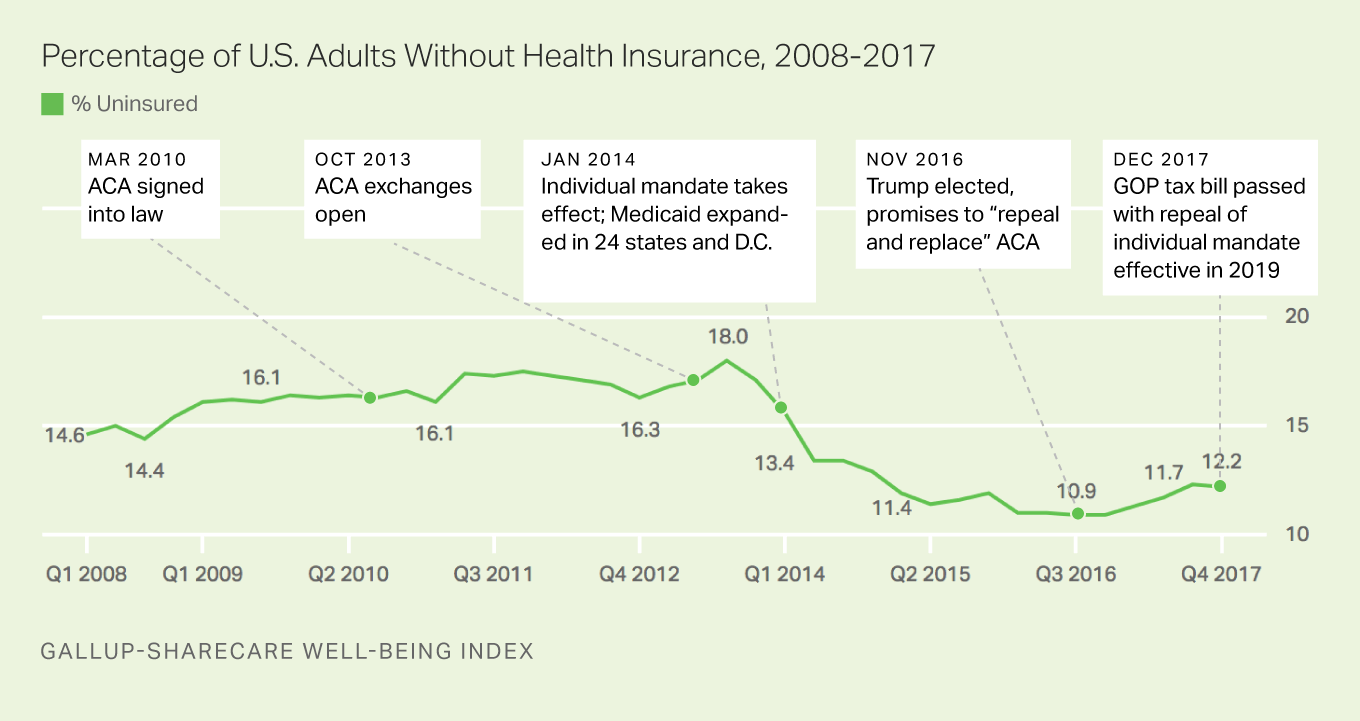New Report: Congressional Republicans Fed Up With Inaction
After new POLITICO reporting reveals mounting frustration among even Congressional Republicans about the Trump Administration’s failure to confront the national opioid crisis, Protect Our Care Campaign Director Brad Woodhouse released the following statement:
“When Republican Members of Congress are willing to go on record about your Administration’s continuing failure to confront a massive public health crisis, you have a problem. President Trump needs to wake up to reality and get serious about this out-of-control crisis instead of continuing his harmful efforts to gut the agency charged with fighting it and to sabotage Medicaid, which funds one-fifth of all substance abuse treatment nationwide.”
POLITICO // BRIANNA EHLEY and SARAH KARLIN-SMITH // 02/06/2018
President Donald Trump’s war on opioids is beginning to look more like a war on his drug policy office.
White House counselor Kellyanne Conway has taken control of the opioids agenda, quietly freezing out drug policy professionals and relying instead on political staff to address a lethal crisis claiming about 175 lives a day. The main response so far has been to call for a border wall and to promise a “just say no” campaign.
Trump is expected to propose massive cuts this month to the “drug czar” office, just as he attempted in last year’s budget before backing off. He hasn’t named a permanent director for the office, and the chief of staff was sacked in December. For months, the office’s top political appointee was a 24-year-old Trump campaign staffer with no relevant qualifications. Its senior leadership consists of a skeleton crew of three political appointees, down from nine a year ago.
“It’s fair to say the ONDCP has pretty much been systematically excluded from key decisions about opioids and the strategy moving forward,” said a former Trump administration staffer, using shorthand for the Office of National Drug Control Policy, which has steered federal drug policy since the Reagan years.
The office’s acting director, Rich Baum, who had served in the office for decades before Trump tapped him as the temporary leader, has not been invited to Conway’s opioid cabinet meetings, according to his close associates. His schedule, obtained under a Freedom of Information Act request, included no mention of the meetings. Two political appointees from Baum’s office, neither of whom are drug policy experts, attend on the office’s behalf, alongside officials from across the federal government, from HHS to Defense. A White House spokesperson declined to disclose who attends the meetings, and Baum did not respond to a request for comment, although the White House later forwarded an email in which Baum stressed the office’s central role in developing national drug strategy.
The upheaval in the drug policy office illustrates the Trump administration’s inconsistency in creating a real vision on the opioids crisis. Trump declared a public health emergency at a televised White House event and talked frequently about the devastating human toll of overdoses and addiction. But critics say he hasn’t followed through with a consistent, comprehensive response.
He has endorsed anti-drug messaging and tougher law enforcement. But he ignored many of the recommendations from former New Jersey Gov. Chris Christie’s presidential commission about public health approaches to addiction, access to treatment, and education for doctors who prescribe opioids. And he hasn’t maintained a public focus. In Ohio just this week, it was first lady Melania Trump who attended an opioid event at a children’s hospital. The president toured a manufacturing plant and gave a speech on tax cuts.
Much of the White House messaging bolsters the president’s call for a border wall, depicting the opioid epidemic as an imported crisis, not one that is largely home-grown and complex, fueled by both legal but addictive painkillers and lethal street drugs like heroin and fentanyl.
“I don’t know what the agency is doing. I really don’t,” said Regina LaBelle, who was the drug office’s chief of staff in the Obama administration. “They aren’t at the level of visibility you’d think they’d be at by now.”
Conway touts her opioids effort as policy-driven, telling POLITICO recently that her circle of advisers help “formalize and centralize strategy, coordinate policy, scheduling and public awareness” across government agencies.
That’s exactly what the drug czar has traditionally done.
Conway’s role has also caused confusion on the Hill. For instance, the Senate HELP Committee’s staff has been in touch with both Conway and the White House domestic policy officials, according to chairman Lamar Alexander’s office. But lawmakers who have been leaders on opioid policy and who are accustomed to working with the drug czar office, haven’t seen outreach from Conway or her cabinet.
“I haven’t talked to Kellyanne at all and I’m from the worst state for this,” said Sen. Shelley Moore Capito, a Republican from West Virginia, which has the country’s highest overdose death rate. “I’m uncertain of her role.” The office of Sen. Rob Portman (R-Ohio,) another leader on opioid policy, echoed that – although Portman’s wife, Jane, and Conway were both at the event with Melania Trump this week.
Some drug abuse experts and Hill allies find a silver lining, noting that Conway’s high-rank brings White House muscle and attention.
“If I want technical advice, I’m going to work with Baum,” said Rep. Tom MacArthur (R-NJ), a co-chair of the Bipartisan Heroin Task Force. “If I want to get a message to the president, Kellyanne is somebody that I know I can talk to.”
“It’s a really good sign that one of the president’s top advisers has been assigned to such an important topic,” said Jessica Hulsey Nickel, president and CEO of the Addiction Policy Forum.
Baum’s email called the drug office the “lead Federal entity in charge of crafting, publishing and overseeing the implementation of President Trump’s National Drug Control Strategy,” which multiple agencies review. He called Conway’s opioids cabinet an “interagency coordinating apparatus for public-facing opioids-related initiatives” and said that it was not overseeing national policy. But several administration officials did say her cabinet was indeed focused on a variety of policies.
Whatever Conway’s ties to the president, her career has been in polling and politics, not public health, substance abuse, or law enforcement.
Some of her “cabinet” participants do have a broad, general health policy background. But they don’t match the experience and expertise of the drug office’s professional staff. In her circle is Lance Leggitt, the deputy director of the White House’s Domestic Policy Council who was also chief of staff to former HHS Secretary Tom Price. Another top Price aide, Nina Schaefer, recently returned to the Heritage Foundation. The conservative think tank then touted her as having managed “the development of the HHS response to the opioid abuse crisis,” but when POLITICO recently tried to contact her, she said through a spokesperson she was not an expert on the topic.
Among the people working on the public education campaign that Trump promised is Andrew Giuliani, Rudy Giuliani’s 32-year-old son, who is a White House public liaison and has no background in drug policy, multiple administration sources told POLITICO. Nor has Conway spent her career in the anti-opioid trenches.
“Kellyanne Conway is not an expert in this field,” said Andrew Kessler, the founder of Slingshot Solutions, a consulting group that’s worked on substance abuse with many federal agencies.“She may be a political operative and a good political operative,” he added. “But look. When you appoint a secretary of Labor, you want someone with a labor background. When you appoint a secretary of Defense, you want someone with a defense background. The opioid epidemic needs leadership that ‘speaks’ the language of drug policy.”
The set-up befuddles other experts who’ve worked on substance abuse for prior administrations. Fresh ideas are fine, they say. But the drug office has a purpose.
“The whole reason we created ONDCP in 1988 was to be a coordinating force with power in the government and to bring together 20 agencies, many reluctant to be involved in drug control,” said Bob Weiner, who served in that office in both the George W. Bush and Clinton White Houses. “This is exactly when the agency should get maximum support from the White House,” he added.
An ONDCP spokesperson told POLITICO the office “works closely with other federal agencies and White House offices, including Kellyanne Conway’s office, to combat the opioid crisis” but declined to say whether the office’s career experts have attended any of her “opioids cabinet” sessions. The drug office is still crafting the annual drug control strategy, outside the Conway group, administration officials said.
A senior White House official confirmed that officials considered kicking off the media campaign with a big splash during the Super Bowl, but that fell through. Beyond that, many experts on drug policy and substance abuse say messaging alone won’t solve the problem anyway. People with addiction need treatment, and many people get addicted in the first place to painkillers their doctors have prescribed. An ad campaign won’t solve that.
One big test for the drug office will come when Trump releases his budget Monday, which is expected to slash the office’s budget, turning much of its work over to HHS and the Department of Justice. Both departments are developing their own opioid approaches; in past administrations, the drug czar would have coordinated. Lawmakers are already sounding the alarms over the budget plan.
A bipartisan group of senators last week wrote a letter to White House budget director Mick Mulvaney, urging him to reconsider and maintain the office’s programs that “prevent and fight against the scourge of drug abuse.”
Pushback to a similar proposal last year led the Trump administration to reverse the decision and maintain the office’s budget. Lawmakers hope that there will be a similar outcome this time — along with a smarter utilization of the drug policy office.
“What we haven’t seen is the kind of coordination of critical programs that ONDCP has traditionally done,” said Sen. Maggie Hassan, a Democrat from New Hampshire, another state with one of the highest overdose death rates in the country.
Trump officials say it was the Obama administration that began undermining the drug policy office, demoting the director from the Cabinet, shrinking the staff and stressing the health aspects more than a law enforcement-focused “war on drugs.” They say the emergency requires a new approach.
Bob Dupont, who served as the second White House drug czar under President Gerald Ford, before the formal drug policy office was created, and still informally advises the Justice Department on drug policy, believes the White House will eventually realize it needs the expertise that ONDCP has to offer.
The West Wing doesn’t “have the staff or capability” to carry out drug policy work like ONDCP does, Dupont told POLITICO. “I don’t think swashbuckling your approach is going to last very long.”




